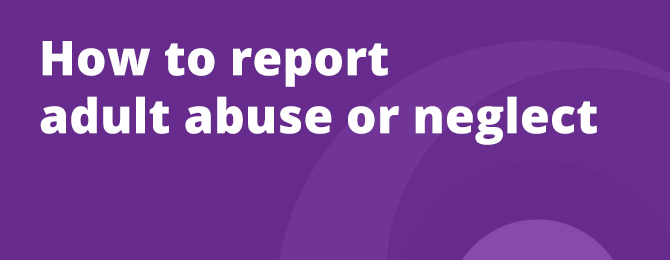How to report adult abuse or neglect

If you're worried an adult is being abused or neglected, even if you're unsure, please report it.
Call 999 if the person is in real danger now
If you want to speak to someone, call 01752 668000 and choose the adult social care option, or call 101 to report it to the police.
What to report
When you get in touch with the council, they will ask you some questions, such as:
- the name and date of birth of the person you're worried about
- their address and contact details
- Why do you think they're at risk or being abused?
Types of abuse
Adult abuse takes many forms, including:
- physical abuse such as hitting, slapping or pushing
- neglect such as not being cared for properly, ignoring medical or physical needs, not having enough food, water or heating
- emotional or psychological abuse such as shouting or swearing, threats or intimidation, not being allowed to see friends and family or making your own choices
- sexual abuse such as unwanted touching, kissing, sexual intercourse or sexual contact without consent or with pressured consent
- financial abuse such as theft, forcing someone to sign over money or property, making financial transactions without consent
- discriminatory abuse, such as comments about someone's disability, age, illness or sexual orientation
- domestic abuse such as controlling, forceful, or threatening behaviour, honour-based violence and female genital mutilation
- modern slavery, such as human trafficking and forced labour
Adults at risk
An adult at risk is someone aged 18 years or older who might not be able to look after themselves, protect themselves from harm, or stop themselves from being exploited. They may:
- have a mental health problem or illness, including dementia
- be involved with drug or alcohol abuse
- have a physical or learning disability
- be old and frail
- not be able to speak up for themselves
- neglect themselves and/or their home
Tricky Friends
'Tricky Friends' is a short animation to help people understand what good friendships are, when they might be harmful, and what they can do.
It is important that people with learning disabilities and autism, those who have cognitive difficulties, and also children and young adults, have positive opportunities to make and maintain friendships. This is designed to help them do this, to reduce the risk of harm and exploitation in groups who may be less able to recognise the intentions of others, and to raise awareness of issues like exploitation, county lines, and cuckooing.
The animation is only 3 minutes long and can be used with or by anyone: carers, family, organisations, and groups.
Is the information correct?
Let us know if the information on this page is wrong and needs to be updated.




